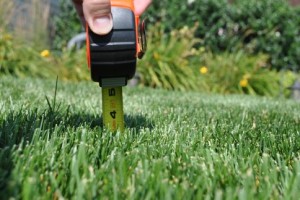
Don’t cut your grass too short.
Higher heights usually provide for a deeper root system, better overall appearance, and less amounts of invasive weeds. Cutting at 3-3.5 inches is recommended.
Don’t remove any more than one third of the grass leaf at any one cutting
If circumstances arise that a lawn gets too tall and you just have to lop off a bunch to get caught up, bight the bullet and break it down into several mowing’s to get caught up with 3 or so days between cuttings.
Try to avoid mowing when the grass is wet
When mowing only a third with each cutting, you can safely leave the clippings that will quickly decompose and add nutrients back into the soil. Contrary to popular opinion, grass clippings do not add to thatch buildup. Grass blades are made up of about 75% water.
Mow your lawn in a different direction with each mowing
This especially applies specially with lawns of shorter grass types. Altering the direction ensures a more even cut since grass blades will grow more erect and less likely to develop into a set pattern.
Keep your mower’s blade sharp
This means having your blade sharpened several times during the mowing season. A good idea is to keep several blades around so you’ll always have a sharp one on hand.
Don’t forget to change your mower’s oil
At least once during the mowing season, maintain the mower engine and replace the oil.
Don’t use old fuel
If you didn’t drain your gas tank in the fall, or use a fuel stabilizer, don’t use that old gas, it can cause a number of problems. Better to use fresh gasoline to begin the new mowing season.
Be careful with the clippings
Avoid discharging grass clippings into the street or onto driveways where they can be washed into the storm sewers and add to the pollution of our waterways.
Safe Mowing Tips
The center for Childhood Safety offers these tips for safe lawn mowing:
- Keep children and pets out of the yard while mowing.
- Do a walk-through of the area before you begin mowing. Clear the area of large sticks or other debris.
- Wear clothing that offers some protections, like sturdy shoes with non-slip soles to provide good traction. Wear eye protection, like glasses, sunglasses, or goggles, while mowing.
- Read the operating guide for your mower. Make sure you understand all of its safety features prior to use.
- Make sure your new power mower has a “dead man” control that stops the mower if you let go of the handle. Do not disable this or other safety features of your mower.




